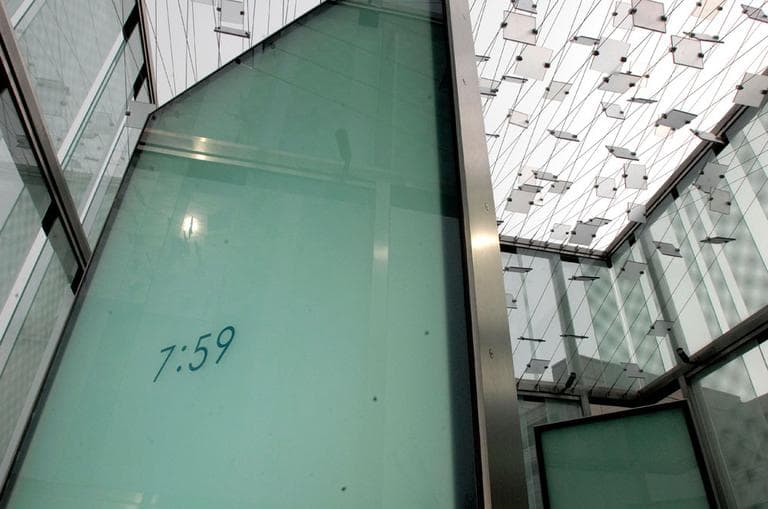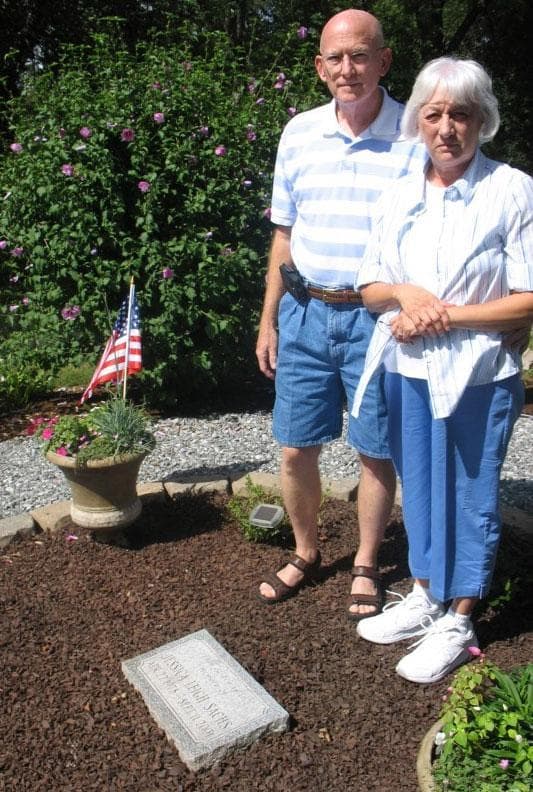Advertisement
10 Years Later, Boston's 9/11 Wounds Still Felt

The Sept. 11 terrorist attacks started here in Boston, with two flights headed to Los Angeles making a tragic detour.
For 23-year-old Jessica Sachs, 9/11 started early, as she was getting ready for her first work trip as an auditor with PricewaterhouseCoopers. She was living at home with her parents in Billerica after graduating from the University of Massachusetts Amherst. Her father Stephen and mother Karen were camping when they heard the news.
"When they said it was a plane that had left Boston just before 8 a.m. bound for LA, we knew it was Jessica’s plane," Karen Sachs said. "And when they said that, I was hysterical, he was hysterical, we were yelling, screaming or something. People in the campground came to see what was going on."
"The only peace we have is that those that were on the first plane, from everything that the FBI shared with us, they really knew nothing of what was happening," Stephen Sachs said, "other than someone supposedly was sick on the plane and they were going to land in New York."
The morning of Sept. 11, no one understood what was going on. Not even officials at Logan International Airport, as made clear by their first statement that morning.
"We’ve closed the airport to all arriving and all departing flights," said Joe Lawless, Massport's director of public safety, to the press. "We’ve increased our security measures. We’ve activated our family assistance center at the Hilton Hotel based upon some reports that some of these flights may have originated from Boston."
According to the Massachusetts 9/11 Fund, 206 people from the state or with strong Massachusetts ties died on Sept. 11.
Jessica Sachs was on American Airlines Flight 11, the first to hit the World Trade Center. United Airlines Flight 175, also bound for Los Angeles, left Boston and hit the second tower. Ten hijackers made it through Logan security checkpoints with box cutters. Their choice of Boston has left an indelible mark on the city and spread tentacles of pain throughout the state. According to the Massachusetts 9/11 Fund, 206 people from the state or with strong ties to Massachusetts died on Sept. 11.
Then-Gov. Jane Swift was on her farm in Williamstown, in the western corner of the state, that morning.
"I was out for a run early on the morning of Sept. 11. It was a glorious day, as everybody remembers," Swift said. "It’s likely, had I looked up, that the flight path of those jets were going somewhere pretty close to over my head."
When she got back and learned what happened, State Police drove her to the emergency bunker in Framingham. She took stock of what was happening — the airport closed, roads jammed, everyone looking for answers. And she didn’t have any.
Advertisement
"I had many moments on that day where my staff and others were urging me to do a press conference and to talk to the state and I was very reticent because I felt like there was nothing I had to say. There was nothing newsworthy to tell them," Swift said. "But my studies and reflections since then is that sometimes leaders just need to be visible and to reassure."
There was little reassurance on that day, says Larry DiCara, a former Boston City councilor and a law partner at Nixon Peabody LLP.
Standing outside his building in downtown Boston, he remembers getting to work late and finding the office in chaos, not knowing whether to stay or leave. Soon his high-rise and most others in Boston were evacuated as a precaution.
"There was a way in which Boston was the unacknowledged other city in 9/11."
James Carroll, Boston Globe columnist
"Nixon Peabody is on floors 23 through 27 in a location where if there were another plane it would be a likely place for that plane to go," DiCara said. "So late in the morning they evacuated the building. And then along with nearly everyone else in downtown Boston, I had to decide where to go and what to do."
Like most everyone, he found comfort by going to his family. There are no physical reminders of the attacks in Boston, like in New York and Washington, D.C., but the wound to the city was deep because the first attacks originated from here.
"I think we’re less innocent as a city," DiCara, who’s written about the city's history, reflected. "I did not know when I heard that those planes crashed into the World Trade Center that there were people on those planes who I knew — not my closest friends, but acquaintances. And I think of that a lot."
Whether Boston was chosen purposefully because it’s a symbol of independence, freedom and civil rights, or, more likely, because it was a short flight to New York and the large planes were loaded with fuel, we may never know. But that doesn’t mean Boston is to blame in this tragedy, Swift says.
"So I’m a good, practicing Catholic, so it’s relatively easy for me to feel guilty about anything, and I’m a mother on top of it," she said. "But the reality is there are a lot of systems that were manipulated, but truly there’s a small group of people who should feel guilty who never will and never did and those are the terrorists."
Following the attacks, security officials believed Boston could be a future target and the city has been subject to higher security at the port, at the liquefied natural gas facility, and especially at Logan, which has been a testing ground for the newest security measures. These are the reminders that 9/11 started here.
"There was a way in which Boston was the unacknowledged other city in 9/11," said James Carroll, a Boston Globe columnist and scholar-in-residence at Suffolk University, "because it was traumatic for us when we recognized that two of the four planes had taken off from here, that the crime began here, that the plotting has been centered here. If felt like a double blow."

There are 31 Sept. 11 memorials in Massachusetts. The largest are at Logan and the Boston Public Garden. But there are many other small ones honoring specific people. One is a prayer garden with two benches on the grounds of the New Colony Baptist Church in Billerica. It has what looks like a grave marker for Jessica Sachs.
Her parents, Stephen and Karen, don’t visit often, since they’ve moved to Missouri.
"So this is the first time we’ve seen it in a couple of years," Karen Sachs said.
"They’ve changed it and it’s really nice," Stephen Sachs said.
Sachs doesn’t have a grave site because only a few parts of her remains were found. Her parents have cremated them and are saving them to bury in their plots when they die. They moved to Missouri to flee the memory and be closer to their son.
"It’s changed our life incredibly, we were just talking about it," Karen Sachs said. "We could have spent the rest of our life here in Billerica. And instead we ended up moving to St. Louis to be with our son and grandchildren, which we probably wouldn't have done if she were still here."
Jessica Sachs’ death and the deaths of thousands of others were a wake up call to the nation about security and terrorism. But Stephen Sachs feels the government hasn’t heeded the call.
"I think they’ve gotten lucky because the terrorists are not made of the most intelligent lot in the world right now and the leadership is a mess," he said. "Do I believe that it won’t happen again? No, I don’t. I believe that when they finally figure out what they want to do they’ll hit us again."
Since 9/11, Boston has grown as a city: building a new convention center on the waterfront; planting a ribbon of parks along the Rose Kennedy Greenway; and hosting the Democratic National Convention. Boston will never forget Sept. 11. But these are signs the city has moved on from the wounds of that day.
This program aired on September 6, 2011.